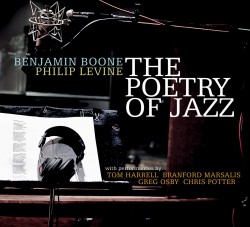MUSIC REVIEW BY Dr. Debra Jan Bibel, Amazon
Music and poetry have a close relationship, always, from rhyming pop tunes to metaphoric tone poems to soundtrack art songs, lieder, of which classical music abounds. Musical accompaniment has been scored for Goethe and Paul Verlaine and, more recently, Walt Whitman and Emily Dickinson and even Bob Dylan. Thinking specifically about jazz and poetry takes us to the 1950s and San Francisco's North Beach and Manhattan's Greenwich Village. Recordings of Jack Kerouac and jazz musicians Al Cohn, Zoot Sims, and Steve Allen epitomize the era.
Now, once again jazz collaborates with poetry in the new album by composer-saxophonist-scholar Benjamin Boone and the late Pulitzer Prize recipient and Poet Laureate Philip Levine. Levine's jazz-inspired poems, homages to Sonny Rollins, Clifford Brown, John Coltrane, and Charlie Parker, are covered as well as similar remembrances. The 17 musicians on this grand project perform on piano, bass, and drums, supplemented by violin, French horn, trumpet, and vocalise. Guest musicians are Chris Potter and Branford Marsalis, tenor saxophones; Tom Harrell, trumpet; and Greg Osby, alto saxophone. Boone himself plays alto and soprano saxophones.
Recordings began in 2012 and were completed in 2014, a year before Levine's death at age 87. Beginning with the poem "Gin" and the youthful initiation to booze, the music conjures the bebop and the Progressive periods up to contemporary explorations. There is swagger in the solos but also sensitive lyricism. Composer-arranger Boone tailors the score for each poem's notions and emotions, as in Romantic and Impressionist art songs. "I Remember Clifford," perhaps the most familiar poem to jazz fans, is marked by Harrell's poignant performance. Marsalis is well cast by his powerful honor to Coltrane in "Soloing." The tenth track, "A Dozen Dawn Songs, Plus One" has avant-garde accompaniment of noisy effects, instrumental screams, suggestions of simmering social and work anger and the brazen craziness of youth. The following work "Our Valley" offers a soaring song of the majesty of landscapes and ephemera. "Call It Music" recalls Kerouac and Charlie Parker care of Osby.
Poetic narration is an instrument itself, and Levine's clarity and strength of recitation are commanding. Indeed, Boone had made this, the music of speech, a particular study with his doctoral studies. [Steve Reich's Different Trains expanded on this concept.] Boone is a Fulbright Senior Specialist Fellow, who studied in Moldova and presently is in Ghana for collaborations. This excellent album reminds us what jazz has missed and what can continue. This is how to hear poetry! Yeah!
Now, once again jazz collaborates with poetry in the new album by composer-saxophonist-scholar Benjamin Boone and the late Pulitzer Prize recipient and Poet Laureate Philip Levine. Levine's jazz-inspired poems, homages to Sonny Rollins, Clifford Brown, John Coltrane, and Charlie Parker, are covered as well as similar remembrances. The 17 musicians on this grand project perform on piano, bass, and drums, supplemented by violin, French horn, trumpet, and vocalise. Guest musicians are Chris Potter and Branford Marsalis, tenor saxophones; Tom Harrell, trumpet; and Greg Osby, alto saxophone. Boone himself plays alto and soprano saxophones.
Recordings began in 2012 and were completed in 2014, a year before Levine's death at age 87. Beginning with the poem "Gin" and the youthful initiation to booze, the music conjures the bebop and the Progressive periods up to contemporary explorations. There is swagger in the solos but also sensitive lyricism. Composer-arranger Boone tailors the score for each poem's notions and emotions, as in Romantic and Impressionist art songs. "I Remember Clifford," perhaps the most familiar poem to jazz fans, is marked by Harrell's poignant performance. Marsalis is well cast by his powerful honor to Coltrane in "Soloing." The tenth track, "A Dozen Dawn Songs, Plus One" has avant-garde accompaniment of noisy effects, instrumental screams, suggestions of simmering social and work anger and the brazen craziness of youth. The following work "Our Valley" offers a soaring song of the majesty of landscapes and ephemera. "Call It Music" recalls Kerouac and Charlie Parker care of Osby.
Poetic narration is an instrument itself, and Levine's clarity and strength of recitation are commanding. Indeed, Boone had made this, the music of speech, a particular study with his doctoral studies. [Steve Reich's Different Trains expanded on this concept.] Boone is a Fulbright Senior Specialist Fellow, who studied in Moldova and presently is in Ghana for collaborations. This excellent album reminds us what jazz has missed and what can continue. This is how to hear poetry! Yeah!
Soundclips
Other Reviews of
"The Poetry of Jazz":
JazzDaGama by Raul da Gama
All About Jazz by DUNCAN HEINING
The Jazz Duck by Editor
JazzTimes by Britt Robson
Step Tempest by Richard Kamins
The Normal School Literary Magazine by Optimism One
Downbeat by Michael Jackson
Jazz Weekly by George W. Harris
The Aquarian by Mike Greenblatt
Improvijazzation Nation by Rotcod Zzaj
New York City Jazz Record by John Pietaro
The Paris Review by Jeffery Gleaves
JazzTimes by Andrew Gilbert
NPR - All Things Considered by Tom Vitale
All About Jazz by Mark Corroto
